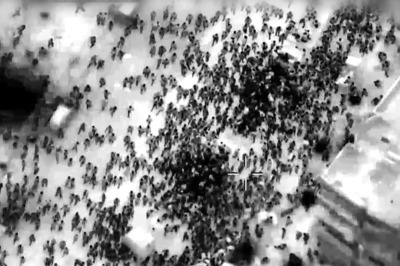
views
London: A letter written by Mahatma Gandhi to the British authorities in 1943 arguing against wasteful expenditure of putting him under house arrest has made it to an UK auction.
The typed letter, signed by Gandhi and written from the Aga Khan Palace in Pune during his detention by the British forces, is expected to fetch between 10,000-15,000 pounds when it goes under the hammer at Ludlow in the county of Shropshire on February 14.
In the letter, Gandhi made a reasoned plea to the British authorities for his and his followers' release. Experts have described it as 'an incredibly important document in world history' because it also signifies Gandhi's final emergence as the one man who could achieve the long awaited independence for India, Daily Mail said.
Richard Westwood-Brookes from Mullock's Auctioneers, who are handling the sale, said the letter is being sold by a man in India who was a freedom fighter with Gandhi. "Letters of Gandhi are highly sought after around the world but this is without question one of the most significant letters. The letters that have appeared in recent years were saying things like 'thank you for my birthday present'," he said.
"But this one is highly significant because it's written from prison. It signifies the moment he was taking on the whole leadership of non-violent moment," he added. The letter also refers to the resolution of the All-India Congress held on August 8, 1942, and Gandhi's aim to achieve independence.
"This letter, couched in coded diplomatic terms, signifies Gandhi's desire to achieve a diplomatic strategical struggle for independence, and eventual successful establishment of the State of India," according to the description of the lot by the auctioneers, who were also behind the last year sale of a collection of material related to Gandhi, including his glasses and prayer book.
Gandhi wrote the letter while he was detained at the Aga Khan Palace in Pune for endorsing the Quit India Movement.
Addressed to the additional secretary of the government of India in New Delhi, the letter says: "It is unthinkable that when India's millions are suffering from preventable starvation and thousands are dying of it, thousands of men and women should be kept in detention of mere suspicion when their energy and the expense incurred in keeping them under duress could at this critical time be usefully employed in relieving distress."
The letter signed and dated Detention Camp October 26th 1943 has two textual corrections in Gandhi's hand signed by him at the end. In the letter, he adds: "As the Government are aware, I offered to meet the member of the Working Committee in order to discuss the situation and to know their mind, but my offer was rejected. I had thought and still think that my talk with them might have some value from the Government stand-point.
"Hence I repeat my offer. But it may have not such value so long as the Government doubt my bona fides. As a Satyagrahi however, in spite of the handicap, I must reiterate what I hold to be good and of immediate importance in terms of war effort.
"But if my offer has no chance of being accepted so long as I retain my present views, and if the Government think that it is only my evil influence that corrupts people, I submit that the members of the Working Committee and other detentes should be discharged."
The sale at Shropshire in the West Midlands also features a large quantity of important Indian documents and artefacts, including manuscripts, letters, photographs and original art.




















Comments
0 comment